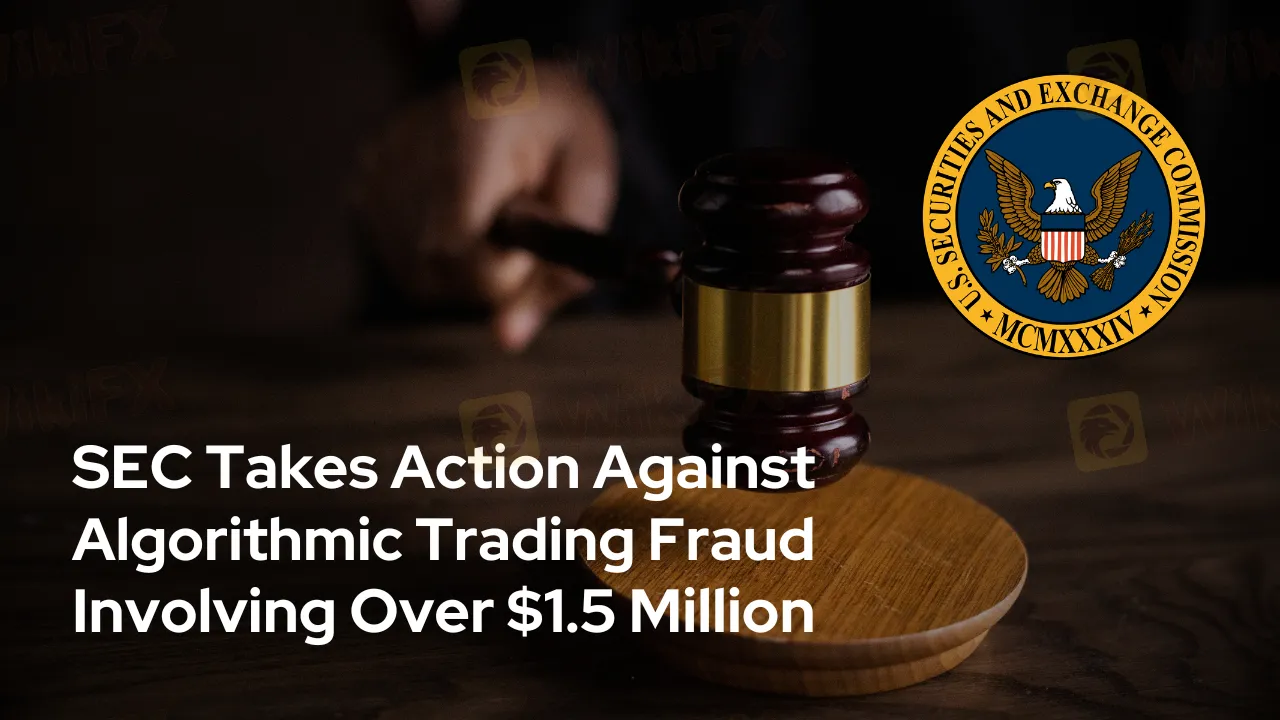简体中文
繁體中文
English
Pусский
日本語
ภาษาไทย
Tiếng Việt
Bahasa Indonesia
Español
हिन्दी
Filippiiniläinen
Français
Deutsch
Português
Türkçe
한국어
العربية
SEC Takes Action Against Algorithmic Trading Fraud Involving Over $1.5 Million
Abstract:The SEC charged Matthew Melton with fraud, alleging he misled investors about his algorithmic trading scheme, collecting over $3.4 million. Melton claimed his algorithm could generate 12% monthly returns but was unprofitable, misusing over $1.5 million for personal expenses and Ponzi-like payments.

In a significant move to safeguard investor interests, the Securities and Exchange Commission (SEC) has recently brought charges against Matthew Melton for defrauding investors through misleading representations related to his algorithmic trading scheme. This decisive action by the SEC underlines its commitment to uphold the integrity of financial markets and protect investors from deceptive practices.
Background of the Case
The case centers around Melton's algorithmic trading approach, specifically his Price Physics trading algorithm. From April 1, 2018, to October 31, 2020, Melton allegedly collected over $3.4 million from at least 23 investors, primarily based in Puerto Rico and sharing a common interest in outdoor activities. Melton's claim that his algorithm could generate consistent monthly returns of 12% was central to attracting these investments. However, contrary to his assertions, the SEC's complaint reveals that Melton's trading activities were consistently unprofitable.
Further complicating the issue, Melton is accused of misappropriating over $1.5 million of the invested funds. Instead of employing the funds as intended for algorithmic trading, he allegedly used them for personal expenses, including travel, sailing, and mortgage payments. This misuse of funds also involved Ponzi-like payments to other investors, a severe breach of trust and financial ethics.
SEC's Legal Actions
The SEC's complaint, filed in the United States District Court for the Southern District of New York, charges Melton with violations of federal securities laws. The Commission seeks extensive relief measures, including permanent injunctive relief, disgorgement with prejudgment interest, civil penalties, and an officer-and-director bar against Melton. This comprehensive legal action underscores the SEC's dedication to enforcing securities laws and ensuring fair play in the investment arena.

In a parallel development, the U.S. Attorneys Office for the Southern District of New York has announced criminal charges against Melton, highlighting the severity of the alleged misconduct.
The Role of the SEC
The Securities and Exchange Commission, as a federal agency, plays a pivotal role in regulating and overseeing the securities industry. Its mission is to protect investors, maintain fair, orderly, and efficient markets, and facilitate capital formation. The SEC's actions against fraudulent activities, like the case against Melton, are vital in maintaining investor confidence and the integrity of financial markets.
Conclusion
The SEC's action in the Melton case is a clear message to the investment community about the seriousness with which it approaches its mandate of investor protection. This case serves as a reminder of the risks involved in algorithmic trading and the importance of due diligence by investors. The SEC remains vigilant in its pursuit of those who seek to undermine the financial system through fraudulent activities.

Disclaimer:
The views in this article only represent the author's personal views, and do not constitute investment advice on this platform. This platform does not guarantee the accuracy, completeness and timeliness of the information in the article, and will not be liable for any loss caused by the use of or reliance on the information in the article.
Read more

Nonfarm Data Lifts Market Sentiment, U.S. Stocks Rebound Strongly
U.S. nonfarm payrolls for May slightly exceeded expectations, stabilizing investor sentiment and easing fears of a hard landing. This upbeat data sent U.S. equities broadly higher, led by tech stocks, with the Dow and S&P 500 posting significant gains. However, behind the optimism lies a fresh round of market debate over the Federal Reserve’s rate path, with uncertainty around inflation and interest rates remaining a key risk ahead.

OctaFX Flagged by Malaysian Authorities
OctaFX has been officially listed on warning lists by both Bank Negara Malaysia (BNM) and the Securities Commission Malaysia (SC). These alerts raise serious concerns about the broker’s status and whether it is legally allowed to operate in Malaysia.

TradingPRO: A Closer Look at Its Licences
In an industry where safety and transparency are essential, the regulatory status of online brokers has never been more important. For traders seeking to protect their capital, ensuring that a platform operates under recognised and stringent oversight can make all the difference. Keep reading to learn more about TradingPRO and its licenses.

Oil Price Breakout Incoming? Investors Should Stay Alert
Oil prices are hovering around a critical level, with potential yet to be fully unleashed. Investors must prepare for sudden changes.
WikiFX Broker
Latest News
SkyLine Guide 2025 Malaysia: 100 Esteemed Judges Successfully Assembled
Vantage Markets Review 2025: Trusted Forex and CFD Trading Since 2009
TradingPRO: A Closer Look at Its Licences
The world could be facing another ‘China shock,’ but it comes with a silver-lining
A Guide to Intraday Forex Trading You Can't Miss Out
CONSOB Blocks Access to 13 Unauthorized Investment Websites
Why STARTRADER Is Popular Among Traders?
New SEBI Regulations on Intraday Trading
Everything You need to know about Barath Trade
OctaFX Flagged by Malaysian Authorities
Currency Calculator


